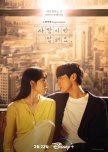
Call It Shim Woo Joo
I was unprepared for how much I liked this drama, especially since I've been in a somewhat prolonged slump in K-drama, so this was a welcome surprise. Without a doubt, Shim Woo Joo is the star of this drama. I love everything about her. She is a rare and refreshing character in the K-drama world. I love how much she feels and isn't scared to show it. I love that she isn't a pushover. I love that she lets herself live her emotions, whether anger, frustration, hate, love, or whatever else. Kudos to Lee Sung-Kyung for doing such a fantastic job with her. She has come a very long way.A lot touched me with this drama, and it's what makes it so relatable. I am from a culture where one is expected to respect elders and authority figures, but as I grew up, I realized respect is earned, not given. People cannot just demand it because culture expects it or because of age or blood relation. I don't know if this drama intends to push this notion, but I respect it for putting it out there, and it's why the story and the way it's told captured me completely.
The raw emotions in this drama and how it looks to tackle societal expectations in who and what love looks like and the need to continually save other people's face/pride, especially of elders, bosses, seniors, and family members, at one's expense, always disguising their true feelings feels more like punishment than reverence. Add to that the hierarchical societal roles and the logic or illogical stance of obedience, responsibility, and adherence at all times is a part of the culture that is hard to accept or even understand if one is not born into it.
As good as Lee Sung-Kyung is, Kim Young Kwang is even better in how he plays Han Dong Jin. I love him in this very stoic, melancholy role. I haven't seen him like this before, apart from his last Netflix drama, Somebody, now that was something else. I liked him as an actor, but that drama proved he isn't just a pretty face with a beautiful smile. The man can act. But this drama doesn't just do a fantastic job of flushing out Woo Joo and Dong Jin as leads but puts the same detail and care in Yoon Joon, Shim Hye Seong, Choi Sun Woo, and even Min Young. It's what makes it such a good drama. One of the best of 2023 to date.
Early on, I understood Woo Joo's need for revenge, and I appreciate her family's reaction to her falling in love with the sworn enemy's son. But I can't find fault in Woo Joo catching feelings for him. What hurts most is that Han Dong Jin was unfairly judged for being the enemy's son. Even before knowing what kind of person he was, they had already considered him as foul as his mother. The sad thing is that when people judge others, they do not define them; they define themselves.
I wish Woo Joo had just opened up to Han Dong Jin, but then life is so much more complex than that. Despite growing up with a selfish mother, I love the person and man he's become. To think that this world has a parent like his makes me cringe and filled with sorrow. I cannot comprehend parents like her, but I now fully understand the saying that every child deserves a parent, but not every parent deserves a child. People say we are products of our environment, but I tend to agree with those who say we are products of our choices despite our environment.
Life is so unfair at times, but it's also a string of natural and unexpected changes and opportunities for growth, despite or maybe because of it. It's admirable how far everyone in this drama comes, or maybe a better word is grows, especially Woo Joo and Hye Seong. I love that falling in love doesn't distinguish between enemies or friends. It doesn't follow human-set cultures or blind traditions. It happens because it's right and, in the process, changes everything for the better.
I love this drama and how everything, spoken and unspoken words, movements, stares- has meaning. It just clicks and falls into place despite how complex we humans can get, as it happened for Woo Joo and Dong Jin and Yoon Joon and Hye Seong. I value this drama for conveying that life is a matter of choices. Just because something is traditional or culturally acceptable, or not for that matter, is no reason to continue, especially when it causes more harm than good. As they say, one's tradition and culture should be a guide, not a jailor. As I said, I wasn't prepared for how much I would enjoy this drama, and to think I almost didn't watch it because of its title. A lesson learned never again to judge a drama by its title.
They say to engage an audience and have them relate to the characters in a story, character development is critical, and if there was any drama that had that in abundance, it's this one. Throughout the 16-week journey, all the characters, even the horrid mom, grew tremendously. What made this drama special was how convincing the actors were, but more importantly, the dialogue and the talking back and forth were beautifully done. I love the message too. Love can forgive all if we let it. All the actors were outstanding, but Kim Young Kwang stood out to me the most. He was just superb. Kudos to everyone involved with this heartwarming drama. Watch it, it will not disappoint you.
Was this review helpful to you?

This review may contain spoilers
Unexpectedly Refreshing—a gem of a drama worthy of anyone's time.
I was totally unprepared for how much this drama touched me. And I am not sure if it was because of the issues it tackled in anger management, paranoia, post-traumatic stress disorder, obsessive-compulsive, or if it was in how Jung Woo (truly a gem of an actor) and Oh Yeon-Seo each executed their roles. Either way, it worked and worked brilliantly, from the writing to the acting and directing, a pleasant surprise that hooked me from the first three episodes. I quickly both invested and rooted for Noh Hwi Oh and Lee Min Kyung to overcome the pain and heartbreak that appeared to be eating at them. I continually felt time stop when I watched this drama, with my rude awakening coming with each episode's abrupt ending (abrupt in my mind's eye). I never wanted the episodes to end.When I started Mad For Each Other, I wasn't sure what I was getting, but before the end of the first week, I knew I wanted more, much more than the half-hour snippets three times a week. I like how fluid everything flows, graciously balancing the comedic, crazy, and serious moments. It's light with a somber undertone in how it tells the story of two people scarred by those around them, to the extent that they cannot live their daily lives without coming across something that triggers them emotionally or mentally. There is a lot to like here, but what I found most pleasing is how both Hwi Oh and Min Kyung recognized they weren't okay, be it emotionally or mentally, and seriously seek out and are committed to getting the help they need to better their former selves, and not just pout or play the blaming game. But that they do it in the same doctor's office sometimes brings on the laughs, craziness, and waterworks, as even the visits to the psychiatrists are marred with those moments that make the viewer laugh, cry, and be mesmerized by the fragility of it all.
Getting insight into both of our lead's past traumas was a disheartening experience, especially Min Kyung's. Not that Hwi Oh's is any less, on the contrary. In a way, their situations mirror each other. To be lied to and betrayed by the person (s) you trust the most, but not only that, to be threatened and used for that love is not an easy overcome, if even one can overcome something like that at all. So, Min Kyung's paranoia and traumatic disorders become even that much more understandable, but so does Hwi Oh's anger for being so easily slighted, accused, and shunned by the colleagues he swore an oath to protect and lay his life down for, including his family members and friends. It is easy to see how they and everything around him could readily trigger his anger. Yet, one can't help but empathize and rally behind them. And, boy, do they have chemistry; the moment they finally get together is golden; I love how tender and protective Hwi Oh gets of Min Kyung. I, of course, cannot get over how much I enjoy the association ladies from Hiwi and Ming Kyung's apartment building. I love how expressive they are all and so in tune, but more so that they were not too ashamed to admit their mistakes and take action when needed most.
But as much as I loved Hwi Oh and Min Kyung's bickering, fights, distrust, and even distress when they first met, I couldn't help but love how those fights and distresses enabled them to see each other's truths in each other. And before they even knew it, they were not only rooting for each other, but deeply caring for one another on their road to recovery, as the anger turns to laughter, and the fear and dark sunglasses turn rosy and trustworthy. But the show is also quick to remind us that recovery is a journey; it's not a straight, steady road. And that is the part that stands out the most for me with this drama. It takes its time to show us, the viewers, how fragile recovery is to those afflicted by mental and emotional issues. That there will always be ups and downs, discoveries, and setbacks. And in the case of Hiwi and Ming Kyung, it's the fragility of their trust that quickly crumbled just as quickly as it was developed at the resurfacing of ex-partners. On second thought, it's not even the ex-partners, but the painful memories and helplessness it drudged up. Luckily, despite the halting progress and discouragements, they can look back and see that those painful memories are just pieces of their lives and draw new strength from them, rather than have them be stumbling blocks.
I admire the matter-of-fact tone the drama takes to raise awareness and push acceptance of social taboos, whether it's through Samantha's transsexuality/transgender (Ahn Woo Yeon) or Min Kyung's presumed extramarital affair, physical and sexual abuse/assault, and mental health, and Hiwi's anger issues. But what's even more admirable is how everybody, from the part-time clerk (Lee Soo Hyun) to Hwi Oh, Min Kyung, the apartment association ladies (Baek Ji Won, Lee Hye Eun, Lee Yeon Du), handles and processes these taboos. Despite their initial shock or even disapproval, they can quickly work through whatever misgiving they have to acknowledge. Just because some people are different, it doesn’t mean they are inferior. And I think it's because they realized the crippling effect of fear and pain, giving them the capacity to be compassionate, loving, and understanding. That's the thing about pain; it brings people closer, because one cannot understand how people feel until they've experienced the same or equivalent kind of pain themselves.
As I already noted, there are many reasons why I loved this drama. Still, the biggest is the ease with which it articulates the overwhelmingness of mental and emotional health illnesses and the pain of being ostracized by society. And I cherish the messages it left me with, some of which were that the journey to full recovery takes time, and no matter how steep the road, maybe there is an end if one stays the course. Recovery includes getting better and achieving a full and satisfying life. And that people are often judged because of their differences, but the reality is that people will always be different. This doesn’t mean those who are different are “wrong”; on the contrary, it's those differences that make the world far more interesting.
A gem of a drama that you will not regret watching. As for the cast of the drama, brilliant, Jung Woo excelled at his role, as it was sometimes hard to watch how everything affected him, especially his helplessness in changing the awful ordeal the woman he loves went through. This leads him to resort to his fists, and as much as I am against violence, there comes a time when using one's words is just not enough. Jung Woo was great at making me feel his every being, but so was Oh Yeon-Seo -- I felt her confusion, fear, and stigma of living not only with a mental health illness, but also the accusation of having an extramarital affair. Kudos to the cast and production team for a drama that awakens the sense in every way possible.
Was this review helpful to you?
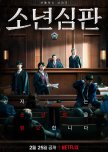
The Effects of Juvenile Delinquency And the Role Society Plays
From its opener, this drama came out swinging, and it didn't stop to the end. I had high expectations, and I am glad it didn't disappoint. I thoroughly enjoyed this drama, everything from the overwhelming storytelling and cases to the cinematography, directing, and especially the acting of the leads and the supporting cast. Both Kim Hye Soo and Kim Mu Yeol were outstanding, and complimentary of each other. Her strong stance on punishment and his clear belief in nurturing and reform completed each other in many ways. It was almost like when she ran cold, he warmed her up, and when he threatened to go cold, she found a way to warm him up. Their personal traumas helped me understand their stance and shaped the story.What I like most about this drama is how daringly it tackled the complex and staggering psychological and social circumstances surrounding juvenile delinquency, the juvenile court system, and the effects it has on the victims, the juvenile delinquents themselves, their families, and even society as a whole. The thought that the stories it tells maybe someone's real life reality is heartbreakingly crushing. Right after I watching Juvenile Justice I read a review that described the script as "having a tendency to devolve into preachy monologues, which did a disservice to the drama". I was utterly surprised, because I thought those preachy parts were precisely what made the drama so impactful, given the heavy subject matter.
As much as I enjoyed the drama, some episodes were hard to watch, almost cruelly so, especially how desensitized society has become to the pain and injustice of others. The drama was thought provoking. It made me question myself and how I would react to the many uncomfortable situations. I have a newfound respect and admiration for juvenile delinquent judges, counselors, social workers, and everybody who works with and around children. I don't think I could do it. The whole time I watched the drama, I kept thinking that when parents cover up for their children's wrongdoings, are they doing it for their children or for their own sake? I also couldn't stop thinking how children as young as nine could be so disconnected from their community and society that they could commit such atrocities; where and how does it go wrong, be it with the children, the parents or society. A lot to ponder.
I am not a parent, but I know it isn't easy. As an aunt actively involved in raising my nieces and nephews, I know how important it is for children to know that they are loved unconditionally, particularly when they make mistakes because everybody make mistakes. But they also need to those mistakes have consequences, especially when they cause harm to others. Parents sternly disciplining their children is the tough love they need. It's far more helpful in the long run than covering up those mistakes, no matter how bad. And this is especially important in a country like South Korea, where society plays a big role in shaping its citizens, that it becomes part of the solution, not a contributing factor. I wonder if I sound preachy, hmmmm!
Juvenile delinquency isn't just a legal issue that can be taken care of by law, but a major social problem that requires urgent attention. I pray this drama in its ten episodes succeeds in casting the needed attention, and more importantly, to relay the message that punishment shouldn't only be about imprisonment, but also development and reform. As Shim Eun Seok says in the drama, it takes a village to raise a child. It's why we still need the "village" strengthening support mentality for our children today. Is Juvenile Justice a perfect drama; perhaps not, but it does a darn good job expressing how the inadequacy of the criminal and judicial justice system, the breakdown of the family unit, particularly parental guidance, and resulting trauma as well as societal neglect exacerbate serious youth crimes. Yes, reforming juveniles is paramount, but their victims matter too and shouldn't be marginalized in the process.
Was this review helpful to you?
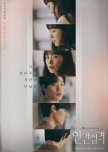
Only in Loss do We Appreciate the Comforts of Life
From the moment I read the announcement that the ageless Jeon Do Yeon and eclectic Ryu Joon Yeol's comeback to the small screen, I’ve had it in my sights. The many teasers I'd watched since in anticipation gave me My Mister vibes, one of the best dramas ever made. The premise of Lost resonated with me in how relatable the story was of ordinary people who, despite trying their best, reach a point in life when they realize their hard work didn't amount to much.I remember thinking as melancholy and dark as things seemed at Lost's opener that it would do for me what My Mister did --shatter me to pieces before methodically putting me together again through the emotional bond that develops between two of the most unlikely people. And Lost does that and more. It took me through the journey of pain not just of our leads but all parties involved, from their vacantness to their gradual wholesomeness as they come to realize what life is to each of them. Lost is penetrating and poignant from its opening, especially in how Ryu and Jeon D Yeon and those around them deliver their roles. From the anxiety to the emptiness and loneliness, it all cuts through the interlocking issues of human nature, social relationships, disconnection from those relations, and the state of existing but not living -- drifting aimlessly through life.
Lost evoked in me some serious emotions and questions. It made me ask myself if I died tomorrow, would I be pleased with the life I've lived; would I be satisfied with the mark I left on the world, or would I even leave a mark and if I would be pleased with the relationships I've had; it gave me a lot of food for thought moments that I appreciated. What I liked most about Lost, other than the way the story was told, was that it brought one of the most prominent issues that afflict everyone the same regardless of status, class, age, gender, religion, ethnicity, or race to the forefront, the feeling of inadequacy. Being ignored, as they say, the worst feeling in the world isn't being lonely; it's being forgotten. Everyone has a secret sorrow, which the world knows nothing about. And often times, the world calls them cold when all they are is sad.
I think I can write a novel about this drama, there is so much to say but I will keep it simple. Lost will probably be one of the few dramas that will stay with me for a long time. Nothing about it was superficial, it was as real as real can be. Nothing was rushed, not the conversations or the tone, nuanced and whole. The journey, the simple messages along the way that relay the facts of life -- that the tests of life are not to break us, but to make us, and that most times, it isn't about the journey or the destination, but the people we meet along the way that can change us in ways we never imagined. It drives the message that all of us as humans have scars, fears, and pains, some of us bear them better than others. Sometimes, that pain blinds us to the pain of others, but sometimes it helps bring everything into focus. That is what Lost has done for me.
What's even more special about Lost is that by the end of it the viewer gains appreciation for all the characters even the not so likable ones. And as bittersweet as the ending of the drama is, it made sense because only in loss, do we appreciate the comforts of life. A thousand and one kudos to the writer, the director, all the actors, they each did a great job getting me as the viewer to relate to them even as I hated some of them. But the standing ovation goes to Jeon Do Yeon and the ever special Ryu Joon Yeol for the wonderful and eye opening journey -- for showing me (us) that inner peace comes when you trade expectation for acceptance. I hope Boo Jung and Kang Jae find their happiness in each other and hopefully so do Jung Soo and Kyung Eun because they too deserve their happiness . As they say, sometimes bad things that happen in our lives put us directly on the path to the best thing that will happen to us. This is one drama everyone would benefit from watching. I know I did.
To read more about my thoughts on Lost check out episodic reviews here
https://www.kdramabanter.com/blog/categories/completed-dramas
Was this review helpful to you?
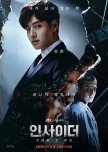
Scriptwriter is Mad, Crazy Good
This scriptwriter is mad, crazy good -- they say a mark of a remarkable script writer can draw in the audience despite the story’s complexity. To slowly but swiftly and persistently keep an audience engaged, guessing, and wholly invested in each character, the heroes and villains, takes a lot of talent. This writer’s ability to spin the web of the story extends further and more profound than what’s visible on the surface, and that’s why despite being confused at times, I remain engaged without judgment for the haze of confusion to clear away that effectively happens at the opening of each episode. I love this writing style. But as good as this writer is, the actors, director, and editing team interpreting the script are even better. Kang Ha Neul and his cast of friends and foes leave me wanting for more each time. One of the better thrillers out there that is deliberate with the choices it makes, heightening and amplifying the cohesive and focused story goal with a consistent and escalating related conflict that is exciting as it is complex.I I truly enjoyed this intensely complicated yet surprisingly fulfilling journey that Insider laid out. I want to give a massive shout-out to Lee Yoo Young for how well she plays Oh Soo Yeon. I never truly appreciated her acting until this one. Given the right part, I believed she could deliver even better, and she's proved me right. Every character plays a key role, especially the villains in Heo Dong Won as Yang Jun and Jung Man Shik as Yang Hwa, they are worthy of praise. It's easy to be slighted when playing against Kang Ha Neul, who is golden as the very complicated yet brilliant Yo Han. Still, Kang Young Seok in the role of Jang Seon Oh and the ever-so-engaging Choi Dae Hoon as No Seung Hwan definitely held their own and deserve to be recognized for their brilliant acting. Insider must not have been an easy drama to write. Kudos to the writer, the director, and the production team. I hope this drama gets awards as it's up there with some of the best of 2022.
One of the better written, directed, acted, and edited dramas I have seen since My Mister. Undoubtedly one of the best of 2022. I loved how complicated yet engaging this drama was; the writer threw a lot at us, and sometimes I felt like I was drowning but not once was I bored. On the contrary, I couldn't wait for the next episode, especially the first three to five minutes that connected all the missing dots. I will miss the whole cast; everybody played a crucial role in making this drama the success it became. As I wrote yesterday, everyone is deserving of an award. But especially the writer for penning such an intricately complex story that, in its complexity, made all the sense possible, Kang Ha Neul, Lee Yoo Young, Kang Young Seok, and Choi Dae Hoon, who has a special place in my heart.
Was this review helpful to you?
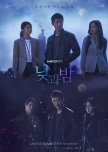
Nam Goong Min Awakens One's Curiosity
Review based on episode three.Nobody and nothing are what they seem in this drama, filled with mind games, mysteries, and eeriness. Awaken was a bit slow in its start-up, but once it got its groove, it's been nothing but one surprise after another. I love how Nam Goong Min plays Jung Woo. Everything, from the way he walks, talks, carries himself, and the carefree demeanor, belying his true feelings and thoughts. But what I like most is his uncanny ability to know what's going on around him and those he takes an interest in, be it his team members, the victims, potential victims, or the culprit(s). I got the sense there was more than one. Jung Woo makes this show worth the watch but then so do Jamie (Lee Chung Ah) and MJW (Yoon Sun Woo), who seem to mirror each other and are Jung Woo's other halves from an incident thirty years ago.
I like Hye Won's (Kim Seol Hyun) loyalty to Jung Woo; I hope she doesn't let her feelings get in the way. I get the sense Jung Woo picked her, knowing how she or, more so, her father connects to the village. I adore Yoon Seok Pil (Choi Dae Chul), Jang Ji Wan (Lee Shin Young), and Deputy Chief Hwang Byeong Chul (Kim Won Hae). I enjoy the humor and chemistry they bring to the team. I continue to be wary of Lee Taek Jo (Baek Ji Won) for her unscrupulous connections and Lee Ji Wook (Yoon Gyung Ho) for his self-serving reporting. As well as CEO Yong Shik (Jang Hyuk Jin) for his treatment of MJW, but think they are all just puppets playing to the tune of a more persuasive puppeteer. Awaken turned out to be a fun ride indeed.
Was this review helpful to you?

Voice 4: Judgement Hour -- Intergenerational Impact of Abuse
To think that this season is based on a true event is mind-boggling; that a Dong Bang Min actually existed in this lifetime is horrific. To imagine that what happened to Dong Bang Min in the drama may have happened to a child to the extent that the child needed to create personalities to escape it is unimaginable; the fact remains, though that abuse does not excuse the horrendous acts the child/man goes on to commit no matter the cause. While watching this drama, I read many comments on Song Seung Heon's performance and how he didn't measure up to detectives of seasons past, but I beg to differ. He was probably one of the most balanced. I am one who strongly believes the first season of this series remains the best. But of all the detectives, I found Derek Jo to be the most rational and composed, particularly since he, same as the rest, struggles with his own demons while fighting to bring some of the most horrific crimes and criminals to justice.I loved this season's cases and stories despite some of them being hard to watch at times. I liked the message each story left behind even more. I commend the writer for depicting such heartwrenching true event stories and the director for bringing them to life. Still, the actor that shone the brightest without a doubt is Lee Kyu Hyung as a villain tormented by self-hate but more the need to survive in a world devoid of love or appreciation. A job well done all around. I liked the drama's choices and the awareness it tries to bring on the importance of the family unit, the damage of abuse and neglect, and the devastating and long-lasting detrimental effects it has on children and society alike. Just as a family can be everything for some, they can be hell on earth for others.
I wasn't ready for Voice 4's end; it felt more personal than the other seasons; I enjoyed it greatly for what it was and came out from it with more appreciation for all the actors but especially for Lee Ha Na in her continued calm, supportive and balanced depiction of the Golden Team and Emergency Center Director for the run of the seasons, Song Seung Heon as the calm, clever, and extremely focused Derek Jo, Baek Sung Hyun as the tormented Shim Dae Shik with a second chance at redeeming himself, which he more than does and very bravely. But mainly, I admired how the show depicted all of Bang Min's personalities and the way he came to realize what he had become in his desperate bid to survive his nightmare.
The message I am left with here is that although the physical, psychological, and behavioral consequences of child abuse and neglect weigh more heavily on the shoulders of the children who experience it, the impact of it does not end with them. Society pays the price both directly and indirectly; covering up the issues under the guise of protecting the family harms more than helps, especially when the family is the root of the problem. It is in the best interest of the families in particular and the communities as a whole to act to stem the effects of such abuses and, rather than find fault with the abused, support them and provide families and communities with the tools to stop maltreatment before it occurs and mitigate intergenerational impacts. To this, I say thank you to the production team.
Now that the Circus Man's journey has come to an end, I look forward to a new journey into Kang Kwon Joo's superhuman hearing abilities. I can't wait to see what else the Voice series has in store. I loved all the OSTs but especially Coming to you 그래쓰(GRASS).
Was this review helpful to you?

It is said, colors, like features, follow the change of emotions
As the saying goes, emotions are the color of the soul. I can't even imagine being color blind. The editing and directing are brilliantly done. I particularly love the explosion of colors; the instance Yoo Han (Heo Hyun Jun, looks amazing)removes his mask, and the rush of emotions reflected in color beaming in Yeon Woo's (Yoo Jun, what beautiful eyes he has) eyes is indeed a beautiful sight. I do agree with Yoo Han; Yeon Woo is so totally pretty. It's only two 16-minute episodes, but I am impressed with the writing, directing, editing, acting, and despite the shortness of the episode, the jest of it comes through. I particularly like how color is used to reflect our lead actors' emotions, mindset, and current state of mind. How wonderful it would be to experience emotions reflected in color, washing over our surroundings. I am intrigued.
Was this review helpful to you?
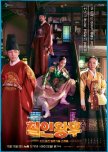
Mr. Queen -- Bold, Funny, and Immeasurably Pleasing
I was very hesitant to start this drama because I wasn't too keen on Shin Hye Sun, but boy, she completely and utterly won me over with her depiction of a Joseon queen trapped in a present-day man's spirit. She's funny, quick-witted, bold, and I dare say this may be her best performance yet. I am a fan. I like that Mr. Queen is bold in tackling some taboo issues in a very well-written script, with a great cast, director, and editor.Of course, it didn't hurt to have Kim Jung Hyun as King Cheol Jong, who comes off as dense but is more receptive and feeling than everybody gives him credit. What kept me going other than the comedy was my need to find out where the real queen's spirit was and, more so, if Bong Hwan soul trapped in someone else's body was the end of him; would he forever be trapped, or was there more to the both of them, the Queen and Bong Hwan. And boy was there more, much more.
As much as I loved our Mr. Queen and King and excitedly waited for each episode to live vicariously through them as much as I couldn't get enough of Choi Jin Hyuk’s voiceover. I doubt the beginning of this drama would've worked as well as it did without him. He definitely made the drama that much more fun to watch. Every moment in this drama was precious. Excellent writing, directing, editing, and acting; this is one of those dramas where you can’t help but enjoy acting, even the villains (except the concubine, okay even her) to the extent that I wished it was a daily drama with as many episodes as a daily one is allowed. I'm not too keen on daily dramas, which tells you how great this drama truly is in its setup, delivery, directing, and production.
Many criticized Mr. Queen for depicting the kind of love it did between a King and Queen with a man's soul in a woman's body, but all I really saw were two people who in their struggle to make themselves known found in each other what they tried so hard to find in themselves, but couldn't unitl they met each other. A story about lost souls, betrayals, honor, loyalty, love, in the simplest yet beautifully complicated way. And I think what I really like about Mr. Queen is that even when it was serious, it didn't forget how to be funny and arrive at its point steadily yet graciously.
As far as I am concerned, Mr. Queen came to a great ending to a flawless drama. It was a blessing during a very trying time globally with a pandemic that left all of us fearful of what's to come. But, Mr. Queen, in its 16+ weeks, managed to give me and many of us immeasurable pleasure. For that, I am forever grateful to the writer, director, actors, and production team for allowing me to live vicariously through all its funny, happy, and, at times, not-so-happy moments. More so, I'm glad I decided to watch this drama that beautifully and so seamlessly showcased the many facets of our fantastic leads and their supporting cast that I may have otherwise missed had I decided not to watch it as I'd originally planned.
Kim Jung Hyun said he chose the role of King Cheoljong for its comedic possibilities; he wanted to do a project that would make people laugh and help them forget the pandemic, even if for an hour. He, our beautiful and gifted Shin Hye Sun, the incredibly talented cast, writer, director, production team, and especially Choi Jin Hyuk, have done that and much, much more. A long-standing ovation to anyone and everyone involved in the art that became Mr. Queen, this is one drama none of us will soon forget. Highly recommended!
Was this review helpful to you?
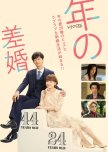
Age Gap Marriage
Toshi no Sakon, which literally translates to age gap marriage, struck me with its cinematography. It's beautifully shot, and I liked how vague the first five minutes about the identity of Murakami Maiko's (Aoi Wakana) husband were. I found some elements of the show refreshing, despite some other elements being a typical Japanese rom-com genre where a sheltered female who has never been in a relationship meets a handsome young man falls in love and end of story.Toshi no Sakon is different in that things happen in reverse. The sheltered girl is more or less forced to go on an arranged marriage matchmaking session. When she meets her match, she instinctively attracted to him and his agreeable nature despite the huge age difference. He, Hanasato Harumi (Takezai Terunosuke), who decides to only meet her to appease his client Murakami Genichiro (Fukikoshi Mitsuru) Maiko's father, is taken by her forwardness, and before we know it, they are married. And this is when the story begins.
I liked Maiko as a character, and Aoi Wakana for her ability to portray Makio in a way that made me believe in her sincerity, innocence and maturity despite her young age, and for boldly pursuing her heart's desire in a culture where one, especially a female, isn't always open about their emotions. She even initiatives the first kiss before their third date, and practically proposes to him. But I enjoyed most about her loudly expressing her inner voice, which is probably what endeared her to Harumi for being the complete opposite of him. As for Harumi, I admired his honesty and how amiable he was to Maiko despite being much older, and more set in his ways, how intrigued he was both physically and mentally. I can't even say it was simply opposites attracted, it was much more than that. It was like the old age meeting the new age and forming an intergenerational connection that's bounded by the differences rather than pulled apart.
I think if Toshi no Sakon had just stopped at that, it would have been your average rom-com with an age gap. But the fact that it dived into the fears and insecurities Maiko faces in her inexperienced love versus Harumi experienced one, and his insecurity with his age and fear of not being able to compete, and the very realistic way the show addresses those insecurities from the Japanese presepctive, is what made Toshi no Sakon stand out even if from my cultural standpoint I may not have understood but that's okay since the show was not for my perspective I still liked and respected the options and directions it takes. The trail and tribulations Maiko and Harumi face as they attempt to measure up to what they each believe are their shortcomings, and the ways the drama tackles and addresses those trials in age, societal and cultural differences, terminology, not only from the perspective of an older man and younger woman, but also from the perspective of an older woman and younger man, and how the intergenerational gap experience despite being the same affects men and women of the same age differently.
The message Toshi no Sakon is so simple -- open dialogue is essential for experiencing, expressing and fostering love in marriage. Despite men and women, be they younger or older, acting differently and communicating in different ways, be in tone or attitude, the need to develop certain attitudes that express love and encourage authentic dialogue is key. Often spouses regardless of age aren't necessarily looking for their other half to find a resolution, they simply want to know their partner is paying attention to them, and acknowledges their fears, and insecurities. And most importantly, not to let societal or cultural differences be they in age or otherwise to limit them or dictate their happiness, because the combination of two different ways of thinking rather than hinder can be the source that elevates them to the next level of their co-existence and ultimately their happiness. Highly recommended, I enjoyed this short but very sweet drama.
Was this review helpful to you?
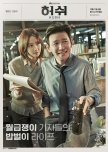
No Hushing The Truth
What an emotional ending to this great journey, Hush, and the many lessons and messages along the way. Still, most of all, I like its unequivocal message in that the most valuable, ethical, and courageous human trait is sticking up for the unpopular, not the popular, and that a good journalist is not the one that writes what people say, but the one that writes what they’re supposed to write despite what they say. No amount of distorting or manipulating of the truth will make it any less so – No Pain, No Gain, indeed.Hush has been a thought-provoking drama. I admire it for it tackling everything from misperceptions, fake news, corruption, and discrimination in all its forms but mostly the worst kind that which has been inflicted on society by society. I thoroughly enjoyed how wonderful a job Hwang Jung Min, Im Yoon Ah, and the rest of the supporting cast, writer, director, and production team have done with this well-rounded slice of life drama. Annyeong, until the next one.
Was this review helpful to you?

This review may contain spoilers
After many years of misunderstandings and betrayals, Hwi and Sun finally get a chance to repair all of the hurt between them, giving each other the strength to do what must be done. When I started watching My Country I wasn't sure what type of journey the writer would take us on, I just knew I wanted to watch it since Jang Hyuk was one of the main lead and, of course, Woo Do Hwan. By episode three I knew there was no way this drama would end with both Hwi and Sun alive and understood it would be a very hard drama to watch not because it was poorly made but because it was that good, it evoked serious emotions - everything from joy, pain, deep sorrow, laughter to heartache, I was right but it was worth the ride. Throughout the journey, it becomes clear that the true love story in My Country: The New Age was always the one between Hwi and Sun, they were always each other’s Number One, no matter what happened between them, be it hurting each other physically and emotionally, but whenever a choice had to be made, they choose each other every time. Even though Sun betrayed Hwi over and over again, Hwi never hesitated to go to his rescue if he needed it. As sad as it was, it was just right that in the end, they chose each other to protect and love until the very end.Hwi, Sun, and Bang-won, every actor brought their best performance and I won’t be surprised if several acting awards are handed out for My Country, particularly in the cases of Jang Hyuk (Bong-won) and Woo Do-hwan (Sun). They both portrayed characters that could easily have become intensely unlikeable, but were able to show moments of vulnerability, sorrow, love, and regret even when committing the most heinous acts. Yang Se-jong was fantastic as well, embodying Hwi with a soft vulnerability that he never lost, despite everything he goes through. What I took from My Country is that we all have a country we are willing to risk everything for and that that “country” is the people we love. A story beautifully told, produced, directed and acted!
Was this review helpful to you?
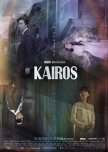
Signal met God's Gift: 14 Days vibes
It's was so good to have Shin Sung Rok back on screen. I remember falling hard for him as Gi Tae Ung in Vagabond. It's also lovely to see Lee Se Young again. I've enjoyed everything she's put out so far and look forward to seeing what she brings to this time-crossing drama, and, of course, Nam Gyu Ri (I fell in love with her in Heartless City) as well. I have to say I already like the setup, directing, and actors so far. The story gives me vibes of Signal meshed into God's Gift: 14 Days. I enjoyed both dramas, Signal, most of all, so this had me quite excited.Kairos is masterful in the build-up of its storyline, the characters, and the suspense within it. The correlation and unison between the past and the present in Ae-Ri and Seo Jin, respectively, as events unfold is beyond stellar. It makes one believe and feel his hopelessness and her apprehension—the darkness engulfing him and the lightness in hers—truly brilliant scriptwriting, directing and editing, and of course, acting—just top-notch. And Shin Sung Rok is beyond astounding in how he beautifully portrays his role as the frantic Kim Seo Jin, expressing desperateness, anger, regret, and hope all at the same time. Add to that; Lee Se Young is phenomenal in her role as Ae-Ri. Without exception, all the actors are great at their respective roles. I especially appreciate how clear and precise the transition between present and past. Easily this is one of the best of 2020.
Never judge a book by its cover; I've heard that said a million times, and it's so true. A drama's rating is in no way a reflection of its mastery. And this one perfected if not excelled at its storytelling and a time-crossing one at that. Saying Shin Sung Rok (Seo Jin) was just good as both his past and present self in his role as Kim Seo Jin is to minimize how exceptional his performance was in this drama. His ability to convey the anguish, pain, grief, and joy in all timelines places him with the best actors, if not in the forefront.
The saying no man is an island is so befitting of the Kairos cast because regardless of how good Shin Sung Rok is, he wouldn't have excelled without the stellar cast leading and supporting him in this fine work of fiction; among the best I've seen. Kudos to Lee Se Young (Han Ae Ri), Ah Bo Hyun (Seo Do Gyun), Nam Gyu Ri (Kang Hyun Chae), Kang Seung Yoon (Im Geon Wook), Jo Dong In (Lee Taek Kyu), Hwang Jung Min (Kwak Song Ja, AR's mom), Shin Goo (the Chairman), and the rest of the action and production team each for their role in keeping us engaged, intrigued and invested-- outstanding performances all around. Nothing about this drama was done halfheartedly or compromised to compensate one timeline over the other. On the contrary, the scriptwriting and storytelling remained intelligent and straightforward to the end. Adding to its greatness was the precise and impeccable directing and editing– all the kdrama star gods must have aligned perfectly to make this one of the best, right there with Stranger, Signal, and Money Flower.
My favorite moments of the drama were the times' Ae Ri and Seo Jin of both past and present entrusted their lives to each other. The level of belief they developed from those one-minute phone calls but more so how the writer and director depicted those moments will stay with me for a long time to come. Their interactions reminded me of Cindy Lauper's song time after time "if you're lost, you can look, and you'll find me time after time. If you fall, I will catch you; I will be waiting. Time after time". Kairos has proven time and time again why it deserves to be one of the best of 2020. I love a drama with a message, and my takeaway from this amazingly done drama is that no evil deed will go unpunished; any evil act done by man to man will be righted if not by man, then by time not now, then certainly later. As said before, you will lose what you value, so treasure it while you can. I love the simple ending. This is one drama I highly recommend; you will not be disappointed.
Was this review helpful to you?
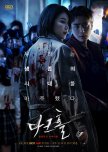
Don't Give Hate a Chance
I decided to watch Dark Hole first because of Lee Joon Hyuk and, boy, does he look fantastic. Secondly, I am a sucker for survival dramas, especially zombie and resident alien-like themes. The first thing I noticed was the camera work, which I really enjoy, but as I continued to watch, I realized that whatever the black hole was, it appeared to feed off and grab an even stronger hold off those whose souls were darkened by whatever was buried deep within them. So, the vibe quickly changed from resident evil to more like an Age of the Ultron kind of feel where resentment developed over time over humanity's brazen maliciousness and corruption in the face of the many injustices leads one person to participate in the eradication of all those they believed deserved to be punished, acting as a judge, jury, and executioner all in one.So, in that sense, Dark Hole is not a typical zombie drama, making it an even more exciting watch. It was funny, disgusting, and at times scary -- based solely on people's emotions and perceptions. The different perspective it takes in combining zombies, mystery, shamanism, science fiction, and horror altogether that is amplified by emotions, ranging from injustice, rage, fear, anger, disgust, and even anxiety, all of which are regulated by an opposing range of emotions that clearly signify that disasters tend to either make leaders or cowards out of humans. I liked Dark Hole for what it was; it doesn't necessarily clearly articulate the how, which for me was one of the biggest questions I wanted to be answered, but it does deliver on its overarching theme, which quite befits our present-day global situation.
Dark Hole is not a drama that will win awards, but it is a drama that tries to impart quite a few meaningful messages. One of the most significant is not to give hate a chance because it may allow for the deepest desires to become the deadliest when one does it. And that humans, more often than not, are their own worst enemies, for, at times, the monsters that rise from the dead are nothing compared to the ones humans carry in their hearts. And the most powerful message of all is that whoever fights monsters should see that they do not become monsters in the process. As they say, if one gazes long enough into an abyss, the abyss will gaze back into them. I enjoyed Lee Hwa Sun and her great fighting skills but loved Lee Joon Hyuk in the role of Yoo Tae Han the most. A man of action rather than words. So different than his role in the Stranger series yet just as appealing.
Was this review helpful to you?
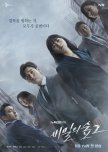
Stranger 2 : adequately fulfilling on it's journey to Stranger 3
Finally, it is all I could think at the start of Stranger 2, three years later, and it was captivating as I expected it to be, worthy of the over three-year wait. Having Lee Chang Joon's voiceover to start the episode was just brilliant. A reminder that the road to justice is long and rife with political tension. And, of course, where there is a crime to be solved, there is Hwang Shi Mok. I loved it. I always enjoy how he meticulously observes, sizes up a situation before questioning or jumping to conclusions. It was also thrilling to see Bae Doo Na reprise her role as Han Yeo Jin, love her with long hair, and Detective Jang. I love seeing them all at work; they click intuitively.It's always great to see a woman in roles typically given to men and Jeon Hye Jin at that. I couldn't wait to see what she brought to the show as the police and ever-powerful prosecution office fought over independent investigative authority. I've always thought it quite weird how the prosecution had sole jurisdiction. So, I was interested to see how the fight would go down and how it would affect Shi Mok and Yeo Jin's fight against injustice. I am always ready when it comes to these two. And of course, Stranger 2 did not disappoint in how it tackled all the issues it presented, from coverups to police and prosecution corruptions to the embedded unscrupulous accepted and worse expected societal norms that hurt more than they help in junior/senior to rich/poor treatments and relationships. And I think what I find hardest to reconcile since I started watching k-dramas is that exactly -- the disappointments in the embedded unscrupulous accepted societal norms.
I loved the many twists and turned in this second installment but, more so, how differently the whole team handled the second season. I was glad to see that it was not a sequence of the first but rather a continued effort to justice's long and politically charged journey. And to see that journey can to an emotional ending as it hopefully continues to its next chapter to an incredibly penned, directed, acted, edited, and produced drama. The beginning and ending words of Lee Chang Joon sum season 2, SM and YJ, entirely—“Doggedly chasing after the truth and marching towards what’s right is a never-ending process. To stop for a moment is to fail. Marching towards change is like having two needles on your feet, with an invisible thread trailing after you, never stopping for breath as you march on. In the belief that a sliver of hope is better than immeasurable despair, we move forward with every determination once again.” This drama called attention to how arrogance, ignorance, and incompetence can, in mere seconds, bring down one’s life work (Chief Choi and Prosecutor Tae Woo). But at the same time, it showed us that one should never give up hope; it’s the light to a better and more fulfilled future for all involved. “Hope is being able to see that there is light despite all of the darkness.” —Desmund Tutu.
As sad as I was as excited for how it started and ended—strong and proud. I especially revered Chief Prosecutor Kang Won Cheol for standing tall for what matters most and putting his juniors before himself; that’s a mark of a true leader. As they say, it’s only after you’ve stepped outside your comfort zone that you begin to change, grow, and transform. Chief Kang’s last act was a reminder that it’s easy even for the best of us to be swayed and lose our way, but the courage is in acknowledging it and getting back on track. It takes a lot of courage to do what he did. LYJ Hanjo’s leader’s reaction to his resignation said it all. She underestimated him for sure, and his final words struck her worse than if she’d been hit by one of those kdrama white trucks of doom. Undoubtedly one of the best crime dramas ever, now and forever. Solid character arcs, acting, development, and portrayals, even SDJ’s character. I cannot wait for season three, finishing what Lee Chang Joon started with a takedown of Hanjo Group. Shi Mok's dream at the finale for me captured everything Stranger 1 and 2 stand for— Hope. I will miss this drama until its next installment and highly recommend both seasons if you haven't watched them yet. Not one disappointing episode.
Was this review helpful to you?

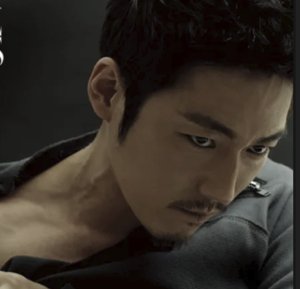
 1
1





















